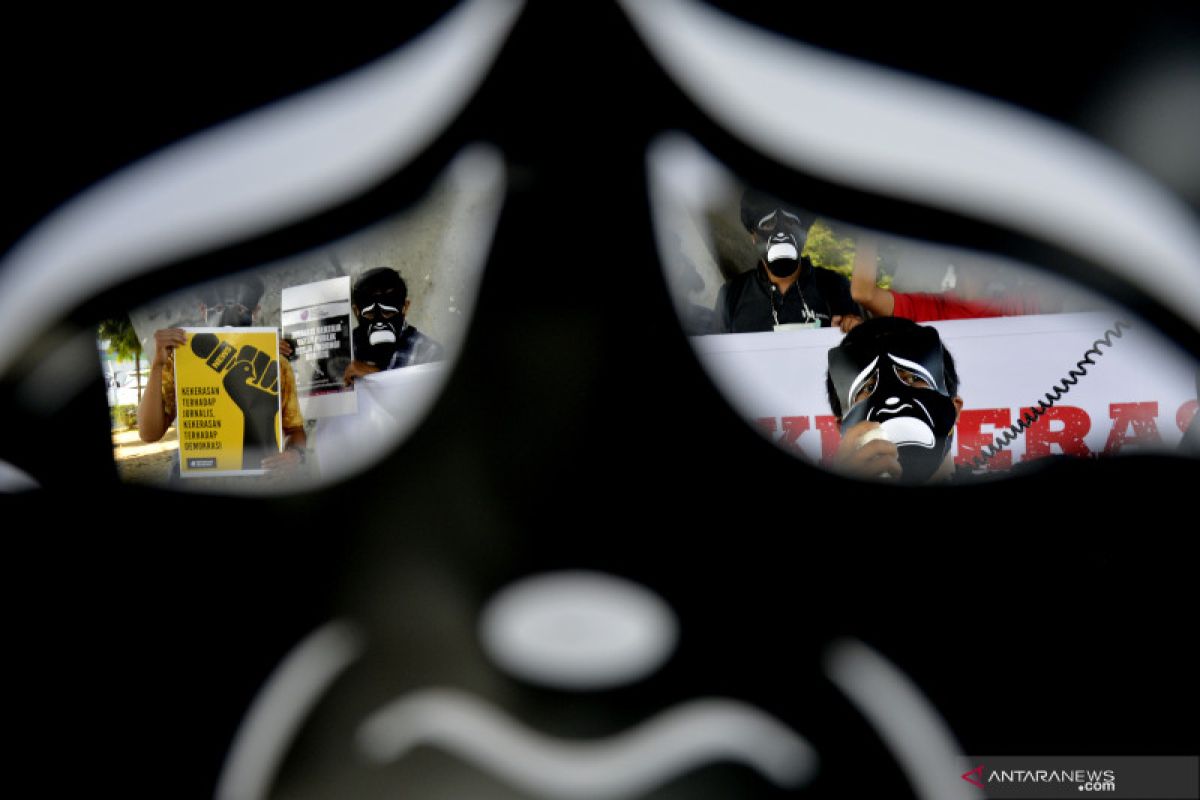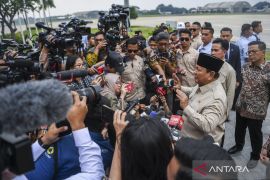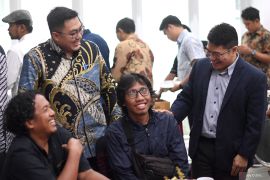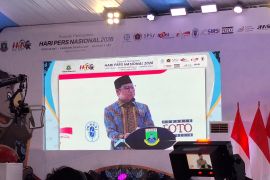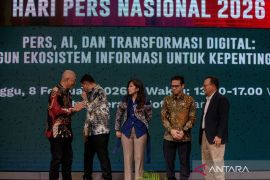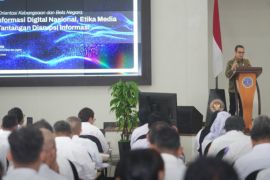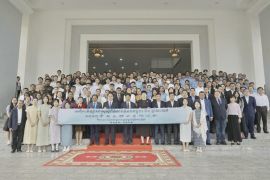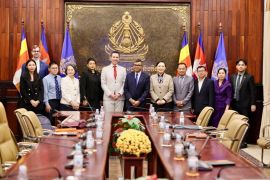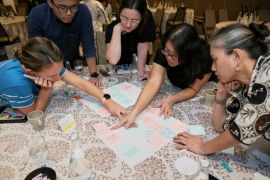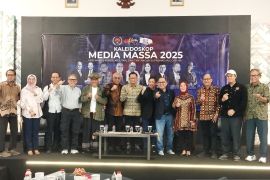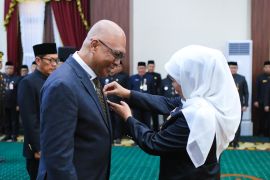With this freedom, the mass media can convey a host of information to support citizens' role in democracy.
In the digital era, digital technology and the online platform revival have changed the way people produce, share, and consume news.
Press freedom is facing a variety of challenges in the current digital era, both due to external factors and issues within the press itself, Muhammadiyah University lecturer Nahria said at an online discussion entitled ‘Press Freedom in the Digital Era’ on Wednesday.
Related news: Demanding probe into Shireen Abu Akleh's murder by Israeli forces
The United States Embassy in Indonesia organized the discussion in commemoration of World Press Freedom Day.
The challenges to press freedom in the digital era include the emergence of social media, the information glut, and the shifting motivation surrounding media creation.
In addition, press freedom is also being hindered by new forms of violence against journalists or media organizations, such as doxing, flayer, news site hacking, and leaking of personal data on social media.
The emergence of unverified media that utilizes free web platforms, such as Blogspot or WordPress, and ineffective press regulations on online media are also presenting their own challenges.
In particular, the freedom of the press in conflict-prone areas such as Papua has not proceeded well, Nahria said.
The acts of violence experienced by journalists in Papua in 2021–2022 have included gender-based sexual violence, threat, terror, and intimidation, she informed.
According to data provided by the Indonesian Press Council, Papua’s press freedom index in 2021 stood at 68.87, making it the province with the second-lowest score out of 34 provinces.
Related news: Publisher rights not anti-digital platforms: Press Council
Meanwhile, according to Reporters Without Borders (RSF), Indonesia's press freedom index score in 2022 is 49.22 (less free), with the nation ranking 117th out of 180 countries covered by the survey.
In 2021, Indonesia's press freedom index score was 62.6 and the country ranked 113th out of 180 countries.
This portrait of Indonesia's press freedom from RSF differs from the Press Council's evaluation. In 2021, the national press freedom index score was recorded at 76.02, an increase from 75.27 in 2020.
The journey to realizing press freedom so that it truly becomes an inseparable part of the society's foundation will require a long period of time and is being hindered due to a variety of challenges and hurdles, Nahria said.
Moreover, in the digital era, where the press industry is continuing to develop amid a veritable flood of information, journalists need to professionally handle a variety of digital challenges to ensure that people obtain quality information.
"Within this digital era, citizen journalism emerged. (With) this citizen, workforce in the journalistic sector became efficient," she explained.
The digital era has the potential to advance freedom of expression. People have the freedom to express themselves and share their experiences via social media, she said.
“The digital era facilitates information access," Nahria said, adding that the freedom of the press must ensure people’s right to information.
The freedom of the press must be fought for with the responsibility of obtaining and presenting accurate news to the public, she added.
This is because the freedom of the press is not only meant for the benefit of journalists, but is also related to people’s right to receive genuine information, she noted.
Related news: Responding to challenges of press in the age of digitalization
Digital Attacks
Chairman of the Indonesian Independent Journalist Alliance (AJI), Sasmito Madrim, said that the threat against journalists has evolved into digital attacks.
The digital era is like a double-edged sword. On the one hand, it is enabling journalists, but on the other, it has become a threat to journalists and media corporations, he said.
For instance, attacks against journalists have become easier to carry out due to the presence of digital platforms, he highlighted.
"Moreover, it has become easier to criminalize (journalists) due to the existence of the Information and Electronic Transactions (ITE) Law," Madrim added.
Digital attacks also have other impacts in the form of high economic loss and trauma, he said.
"When the assets of a cyber media corporation are taken over, and then the content is deleted, it can be imagined how much billions or hundreds of millions are lost when it happens," he explained.
"This is why backing up data is important," he added.
Digital attacks also cause trauma that not only affects the victims, but also their families.
The types of attacks that journalists and media experience include doxing (publication of personal information or identity on the Internet), hacking, and distributed denial-of-service (DDos).
"However, the digital era also brings benefits, such as facilitating the work of journalists and collaboration," Madrim pointed out.
When it comes to journalism in the digital era, AJI is pushing for regulations on digital attacks against journalists.
"Because digital attack is not included within the regulation," he said.
AJI will also bolster information dissemination regarding digital attacks against journalists among law enforcement authorities.
"Afterwards, it will strengthen journalists' security and develop cooperation with digital laboratory," Madrim informed.
"AJI does not yet have human resources that understand digital forensics, even though digital forensics is necessary to find the perpetrators of digital attacks," he added.
According to AJI's data, 43 cases of violence against journalists were recorded from January 1 to December 25, 2021.
The most frequent forms of violence were terror and intimidation (nine cases), physical violence (seven), and coverage ban (seven).
AJI also recorded instances of digital attacks (five), threats (five), and legal prosecution (four).
In terms of perpetrators of such attacks, the police ranked first (12 cases), followed by unknown individuals (10), government officials (eight), citizens (four), professional workers (three), and corporations, military, prosecutors, and civilian organizations (one case each).
Concerning Papua, Madrim noted that, to this day, the province is yet to open access to foreign journalists.
AJI's data shows that 69 requests were submitted by foreign journalists to cover Papua during the 2016–2022 period, with 14 of them rejected and 55 approved.
Of the 14 rejected requests, nine were recorded in 2019.
"In 2019, there were huge anti-racism protests across Papua," he informed.
AJI had tried to confirm this with the Foreign Affairs Ministry, Coordinating Ministry for Political, Legal, and Security Affairs of the Republic of Indonesia, as well as the Presidential Staff Office.
However, to this day, a clear reason concerning the rejection has not been provided.
In 2019, the government also cut off Internet access in the region, which hindered journalists and the public from obtaining information.
As a result, people ended up receiving hoaxes and word-of-mouth information, Madrim said.
Related news: President supports immediate issuance of publisher rights regulation
US Support
Political officer at the United States Embassy in Jakarta, Mark Neighbors, underlined the importance of press freedom across Indonesia, including granting access to foreign journalists to cover Papua.
Everyone needs to know what is actually happening in Papua. Transparency and accountability must exist given that they are important parts of a democracy, he remarked.
The Internet has become a part of human life. It has become easy for people to obtain information anywhere compared to 20–30 years ago, when getting information was hard since there were only telephones and fax machines.
Deputy press attaché at the United States Embassy in Jakarta, Nicholas Geisinger, underlined the need for people to understand the freedom of the press.
The press is the fourth pillar of democracy that complements the executive, legislative, and judiciary branches, and a free press supports the principles of democracy, he explained.
The United States is very committed to protecting the freedom of the press as one of the pillars of democracy.
Open provision and exchange of information have become urgent matters for the United States and Indonesia, Geisinger noted.
Related news: G20 DEWG endeavors to bridge digital gap
Related news: G20 delegations support 4 education-related priority agendas in EdWG
Editor: Fardah Assegaf
Copyright © ANTARA 2022
